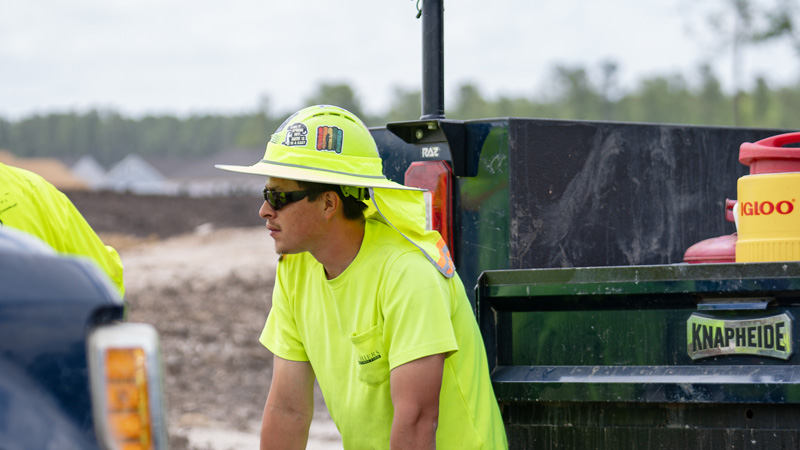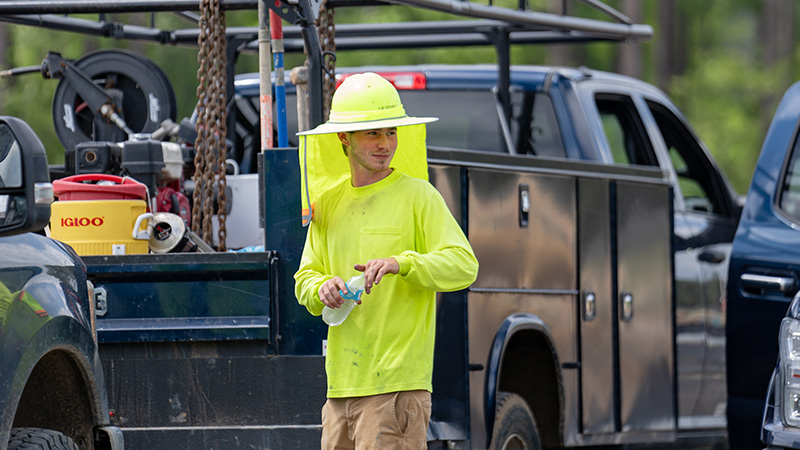Construction Work is Tough
Construction work is tough. Heat stress in construction jobs is even tougher. From long hours to intense physical labor, there are plenty of hazards for new workers to be aware of. One of the most serious, but often overlooked, is heat stress.
Workers new to the construction industry are at an especially high risk of heat stress, with “Over 70 percent of heat-related deaths occur[ing] during a worker’s first week.”
Many people think of training as something you do with new equipment or procedures, but that’s not all. It’s really important to learn how to regulate your temperature in extreme outside environments. Managing heat not only helps you get through your shift but can also save your life.
protect yourself from the dangers of excessive heat exposure.
What is Heat Stress?
Heat stress happens when your body can’t cool itself effectively. Your body tries to stay at a safe temperature, but working in high heat, humidity, or direct sun can push your body’s ability to regulate. This can lead to several heat-related illnesses:
Heat Cramps: These are painful muscle spasms, often a first sign of heat stress.
Exhaustion from Heat: This is a more serious condition with sweating, dizziness, nausea, and fatigue.
Heat Stroke: This is a medical emergency where body temperature rises dangerously high. It requires immediate medical attention.
Signs of Heat Stress
Recognizing heat stress is key to preventing it from getting worse. Watch out for yourself and your coworkers – look for these signs:
- Heavy sweating
- Headache
- Nausea or vomiting
- Weakness or dizziness
- Fast heartbeat or breathing
- Confusion
Preventing Heat Stress
Prevention is your best tool. Here’s what you can do:
Hydration: Drink plenty of water, even before you’re thirsty. Federal guidelines recommend a cup of water every twenty minutes. While sugary or caffeinated drinks may be appealing when you’re on the job and need energy, these beverages will actually worsen dehydration and should be avoided.
Rest: Take breaks in shaded or air-conditioned areas, especially during the hottest parts of the day.
Adjust: Allow your body to adjust to a new environment, like a hot day. If you’re new to hot conditions, start off with light work and then slowly increase your workload to give your body time to adapt.

Gear Up:
- Keep track of heat stress conditions with a heat stress monitor.
- Wear lightweight, light-colored, loose-fitting clothing. Some boots come with a special lining that will help keep your feet dry and cool throughout the day.
- Protect your head with a wide-brimmed ranger hat, moisture soaked cooling hat, or hard hat addons like sweatbands, shades, and visors.
- Keep electrolyte-based drinks in stock, like freeze pops or Gatorade.
- Use sunscreen when able.
- Consider evaporative cooling vests on extra hot days.
Treating Heat Stress
If you feel heat stress coming on, take these steps quickly:
Move to a cool place: Get out of the heat and into shade or air conditioning.
Cool Down: Apply cold packs, use cooling towels, or mist yourself with water.
Rehydrate: Drink cool water or sports drinks to replenish fluids and electrolytes.

Take the Initiative
Heat stress is dangerous enough by itself – but it’s not just the heat that’s the problem. Workplace accidents are more frequent during the summer because intense heat can impair focus and lead to hasty decision-making.
As the heat rises – and looks to continue to rise in the coming years – take initiative. Monitor your own hydration and heat levels while keeping an eye on your coworkers’ health. The best way to prevent heat distress is active learning and action.
Heat Stress in Construction: Conclusion
Heat stress is serious, but it’s preventable. By knowing the signs, how to stay safe, and what to do if you overheat, you can protect yourself. If symptoms are severe or don’t improve, seek medical attention immediately. Heat stroke can be fatal.
The Dirt World Offers Unique and Valuable Services that Make a Lasting Impact on the World Around Us. When You're Here — Get Dirty, Be Safe, Dig First, Learn from Those Who Came Before You, Have Fun, Do Your Best.
